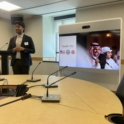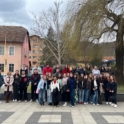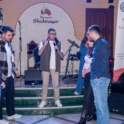Abdulaziz reflects on the highlights from serving as a mentor for CEW.
STORIES
Teaching Tolerance in Indonesia

By Ricky Kurniawan, YES 2009-2010, hosted by AFS in Belaire, TX
“What is the largest religion in Indonesia?” asked Emy, a Muslim friend of mine, to my fourth-grade-students.
“Christiannnnnnnn,” they answered.
For common Indonesian people, their answer sounds odd. It is contrary to the answer that Indonesians are very likely to give. It is also incorrect, as statistically, Islam is the predominant religion in Indonesia. Nevertheless, Emy and I didn’t discredit their answer since it came from the accumulation of their daily experience living in Bebar Timur.
Their village is located in an outer and remote island named Damer, which belongs to Southwest Moluccas Regency in the eastern part of Indonesia. The island is disconnected from the outside world because there is no internet access nor phone signals available there. The only access to the outside world is television, although that is also limited. Unlike many parts of Indonesia, Damer is inhabited entirely by Christian populations; as a consequence, stereotypes towards other religions, especially Islam, still persist.
After working as a primary school teacher in Bebar, Timur for five months, I have undergone some unique experiences with my students in regard to religion. One day, my students looked puzzled when they saw some photos on my laptop that showed me and some of my Muslim female friends who wear hijab. They asked, “Sir, how do you have so many Muslim friends while you are a Christian?” Another day, when they came to school, they pronounced many Islamic phrases such as Assalamualaikum, Alhamdulilah, and Allahu Akbar that they learned from television. I asked them whether they understand the meaning of the phrases, and none of them understood.
Seeing my students’ excitement and eagerness to learn new things, I came up with an initiative to invite my friend, Emy, to come over to my village and school. Emy is teaching in the same island as me but in a different village. On the first day I brought her to my village, many people were staring at her, including my students. It was the first time a Muslim female wearing hijab had visited the village. That day, Emy and I took time to discuss what Emy would share with my students on the following day.
The next day finally came. The class that I conducted on that day was different from regular days because my students had their first experience interacting with someone whose religion is different from theirs. I opened the class by introducing Emy and posing a question to my students “Can you guess Mrs. Emy’s religion?” Without hesitation, all of them replied the same “Islam.”
Afterwards, we invited my students to write their questions about Islam on a piece of paper. Their curiosity somehow generated a lot of questions. Some of their questions included, “What is the meaning of Assalamualaikum?,” “Why do you wear hijab?,” and “Can you eat pork?” After collecting all the questions, it was finally time for Emy to answer each of them in an interactive way. The whole class listened to Emy’s explanation with repetitive head nods. In the middle of explanation, some of them sometimes uttered, ”Uhm, so that’s how it is. Now I understand.” After an interactive and fun discussion, the class was concluded with a photo session.
In the afternoon, Emy came along with me and my students to play on one of the beaches in the village. We were having fun together in the beach as if my students had known Emy for a long time. The whole day, each of them had a personal encounter with Emy, someone who has different religion from them. Emy is their first non-Christian and Muslim friend, and I believe that this type of personal encounter with someone who seems different from us is what can cause stereotypes to crumble.
A few days later, after Emy went back to her village, many of my students asked when she would come back and visit them. I replied with a smile. One comment in particular made my smile even wider on that day. A student approached me and said, ”I think I want to have many friends from different beliefs when I grow older. I can play with them and have fun together regardless our difference.”





